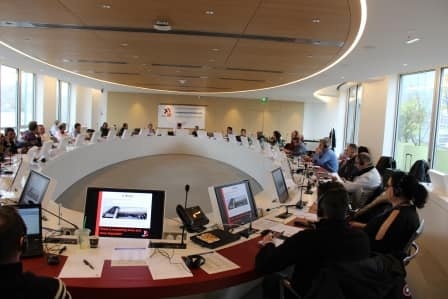Read this article in:
English
23 November, 2018Some 50 trade union and employee representatives from the worldwide operations of Sanofi, the French-based pharmaceutical company, met in Paris on 22 November to discuss the reorganization of the company’s global business units and labour relations developments worldwide, and strengthening the global union network.
The meeting of the Sanofi global union network was held at company headquarters in Paris, the day after the meeting of the European Works Council (EWC). In addition to EWC members, it was attended by union representatives from a number of countries, including Bangladesh, Brazil, Japan, Indonesia, Turkey and Vietnam.
The meeting noted that the pharmaceutical industry is experiencing consistent growth, and company sales and profits are soaring, including at Sanofi. However, changes in production processes and labour relations pose huge challenges for employees.
In September, Sanofi unveiled a major reorganization of global business units to provide greater focus on its operations in mature markets and emerging markets, particularly in China, which has become Sanofi’s second market after the US.
Deep concerns were expressed about the plan, which will be in place from the beginning of 2019, and is expected to have a serious impact on employment. The restructuring process has been ongoing for some years at company locations in different countries.
Delegates reported on the development of subcontracting to reduce costs across all operations, not only in production but also in research and development. In Brazil, the new labour law now allows for unrestricted outsourcing, worsening workers’ rights and conditions.
Implementation of the French law on duty of vigilance was the subject of a specific agenda item. Strong emphasis was put on the role of stakeholders and, in particular, trade unions to help ensure that the law is abided by in all countries where Sanofi operates and along its supply chain. A consultation process has been established and a risk mapping is to be presented in February 2019.
Globally, however, the participants lamented the weakening of social dialogue and poor consideration of employee representatives by management. Changes in the company business structure will be presented to workers’ representatives at the beginning of next year, after they are already in place. Unions are increasingly side-lined and social dialogue is becoming ineffective, while Sanofi claims to be a socially responsible company.
The participants concurred that these developments require a strong response from labour. They agreed to deepen cooperation and strengthen the network, formed a year ago, through better exchange of information and regular communication between regional representatives.
They adopted a statement calling on the company “to establish a mechanism to facilitate regular genuine social dialogue at global level. Constructive social dialogue is critical for quality of life at work and company performance. We again demand Sanofi management to enter into dialogue with the network”.
IndustriALL Global Union assistant general secretary Kemal Özkan stated:
“All reports point to serious shortcomings in terms of workers’ rights. There is a clear deterioration of social dialogue that is in no one’s interest. Having an open channel of communication with management is for us the best way to address these problems together and move forward constructively”.
Sanofi is present in over 100 countries and has production facilities in 36 of them. It employs some 100,000 workers, of whom over half are outside Europe.


